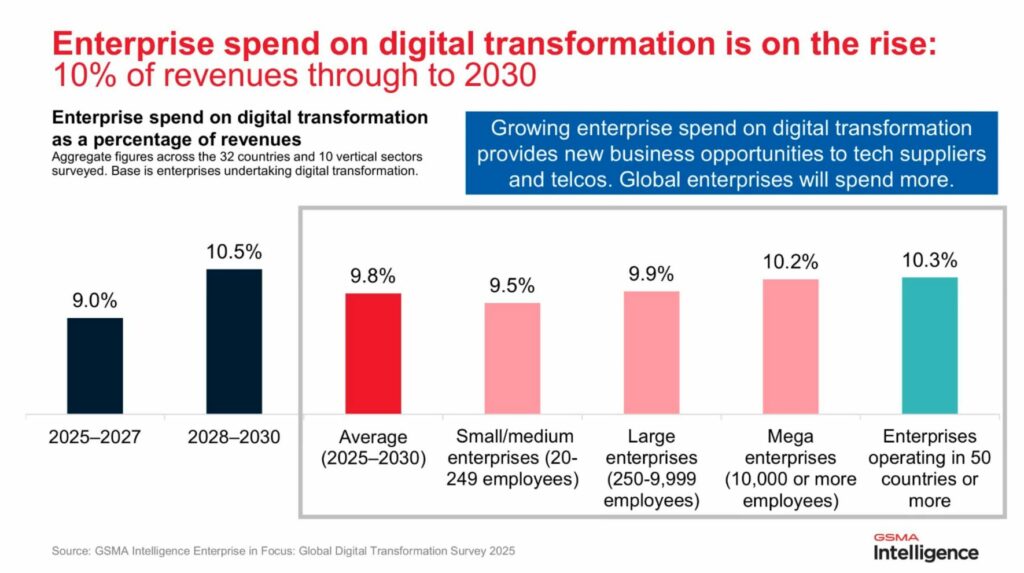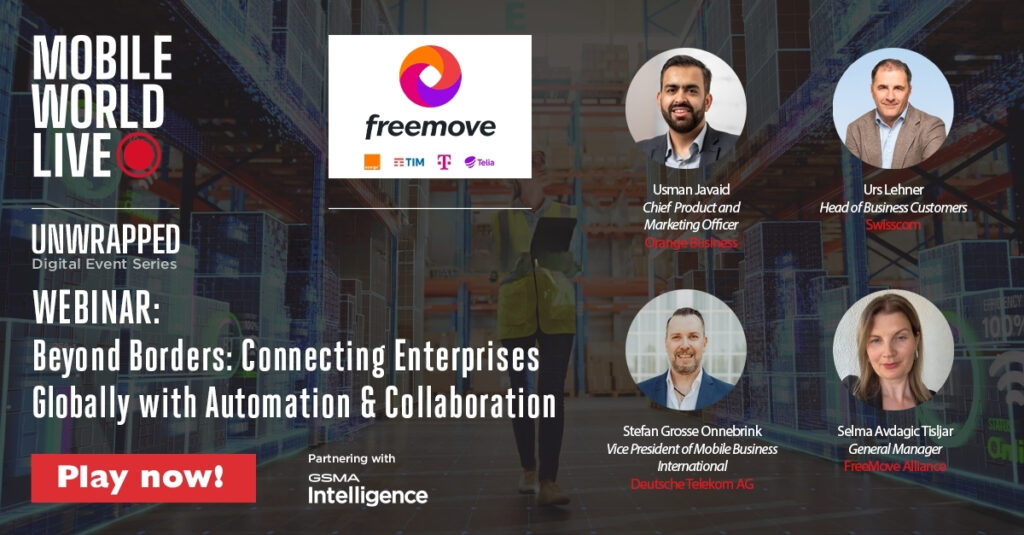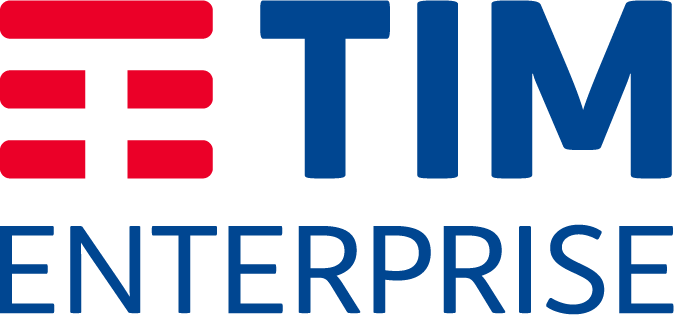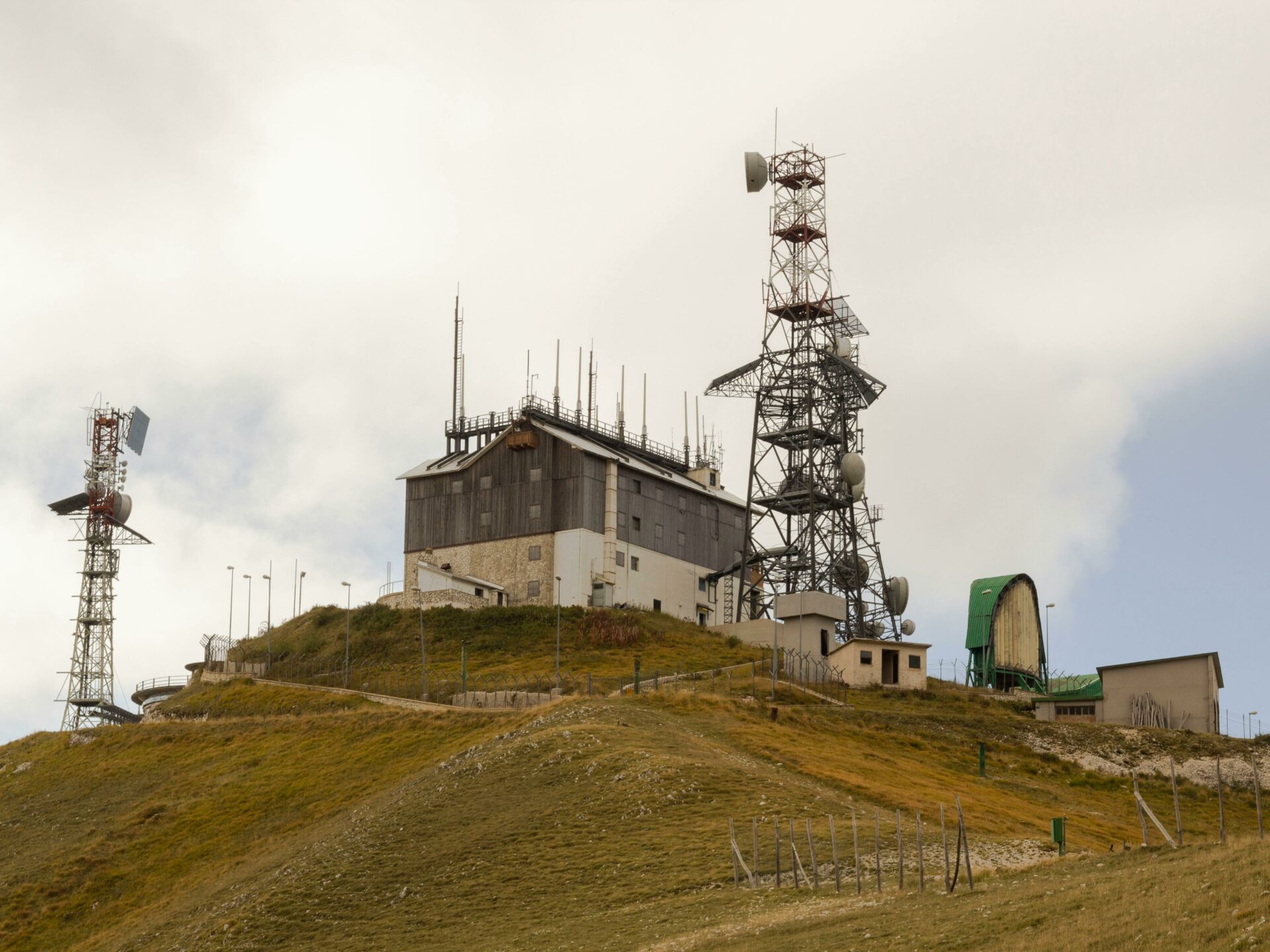Enterprises are moving fast to adopt AI, IoT, and advanced connectivity. Yet the cost of implementation and the complexity of integrating new technologies into legacy systems remain persistent obstacles. To overcome them, companies need more than connectivity: they need partners who can simplify complexity, orchestrate ecosystems, and deliver consistent outcomes across borders.
This was the central theme of the recent Mobile World Live Unwrapped webinar, “Beyond Borders: Connecting Enterprises Globally with Automation and Collaboration.” The FreeMove Alliance’s operators and key experts gathered to explore how automation and collaboration are reshaping the future of enterprise mobility — and why telcos must reinvent themselves as techno-orchestrators.

Enterprise Digital Transformation in Numbers
Pablo Iacopino from GSMA Intelligence shared the headline findings of a global survey of 5,000 enterprises across 32 countries and 10 sectors. The numbers tell a clear story:
- 10% of enterprise revenues will be dedicated to digital transformation by 2030.
- AI, IoT, and connectivity are the top investment areas.
- Global enterprises, operating across 50+ countries, will spend the most — and rely heavily on global mobility services.
Mobile connectivity is at the heart of this shift. Both 4G and 5G are critical enablers of digitalisation, working in tandem with fixed networks to optimise operations. Industries like automotive, logistics, and transportation are at the forefront, demanding robust, borderless mobile services.
But alongside opportunity comes friction. Enterprises point to two main roadblocks:
- Cost of implementation.
- Integration of new technologies with existing systems.
These challenges create an urgent need for orchestrators — providers capable of stitching together disparate technologies into seamless solutions. And that’s where the transformation of telcos becomes vital.
From Telco to Techno: Reinventing the Role of Operators
Enterprises still often view telecom operators as connectivity providers. But the industry is undergoing a profound shift: moving from “telco” to “techno”.
Urs Lehner from Swisscom described the operator’s 15-year transformation journey. What began as a traditional telecom business has evolved into a 50/50 mix of IT and connectivity services, designed to deliver a 360° customer experience. Today, Swisscom offers fully integrated solutions spanning end-user devices, core infrastructure, and cybersecurity — all delivered through seamless, self-service-enabled platforms.
Orange and Deutsche Telekom are on similar paths, emphasising holistic customer experiences, automation, and integration. As Usman Javaid from Orange Business explained, enterprises want mobility to function like the cloud: unified, consistent, and scalable. That means no more fragmented local offers and patchwork integrations. Instead, enterprises expect orchestration, automation, and outcomes.
FreeMove Alliance: Vision and Automation Solution
The FreeMove Alliance is spearheading this industry transition. General Manager, Selma Avdagic Tisljar outlined the Alliance’s mission: to simplify multinational enterprise mobility through automation, orchestration, and collaboration.
At the heart of this vision lies the FreeMove Automation Solution, an orchestration layer designed to meet enterprises wherever they are in their digital maturity:
- Portals for those just beginning their digital journey.
- APIs for advanced enterprises ready for full ITSM integration.
- One unique solution that coordinates services across multiple countries, ensuring consistency and reducing complexity.
The benefits are immediate:
- Fewer tools.
- Lower manual workload.
- Reduced costs.
- Increased transparency and readiness for AI.
But technology is only part of the equation. Selma emphasised that human bonds are just as important as digital ones. FreeMove thrives on co-creation, with members collaborating in commercial, technical, and legal working groups to define onboarding models and continuously evolve the solution roadmap.
Customer Use Cases: From Fragmentation to Automation
Stefan Grosse Onnebrink from Deutsche Telekom shared real-world examples illustrating the different maturity levels that enterprises can be at when digitising mobile fleet management:
- Entry level – A bilingual portal helped a multinational standardise processes across fragmented markets, preparing for future ITSM rollout.
- Intermediate level – A large German healthcare provider centralised inventory data, improving transparency and cost allocation.
- Advanced level – A German airport streamlined workflows, enabling employees (including those with disabilities) to manage mobility directly while cutting outsourcing costs.
- Full ITSM integration – A major tech conglomerate integrated mobile connectivity into its intranet, empowering thousands of employees to self-manage mobility services without fleet management overhead.
The key takeaway? Automation always adds value. It’s not about replacing people; it’s about giving them better tools to work smarter.
The Road Ahead: AI, Sovereignty, and Collaboration
The conversation quickly turned to the future — and three themes dominated:
1. AI Readiness
The FreeMove Automation Solution is not yet AI-driven, but its foundation of data standardisation and orchestration paves the way for features like predictive provisioning and real-time analytics.
Potential use cases are already clear: imagine a field engineer fixing industrial equipment. Today, they juggle paperwork and manual reporting. Tomorrow, AI could auto-generate reports and provide live technical assistance through multimodal interfaces — all powered by orchestrated mobility.
2. Security and Trust
FreeMove ensures security with role-based access controls, encryption, multi-factor authentication, GDPR compliance, and cloud security alliance documentation. For enterprises handling sensitive data across borders, trust is non-negotiable.
3. Digital Sovereignty and Regulation
As enterprises navigate “the new globalisation,” digital trust and sovereignty are becoming critical. Telcos — rooted in local markets yet connected globally — are uniquely positioned to deliver both. Collaboration among operators, guided by compliance, will be key to unlocking new revenue streams in areas like AI, cybersecurity, and 5G slicing.
Conclusion: The Future is Orchestrated
Enterprise digital transformation is accelerating. The investment is there. The ambition is there. But without simplification, orchestration, and trust, complexity will continue to slow progress.
Automation and collaboration are no longer optional — they are the foundation of multinational success. By working together, operators can extend their reach, deliver consistent customer experiences, and unlock new value streams that no single player could achieve alone.
The FreeMove Alliance embodies this future: a trusted orchestrator of people, technology, and partnerships across borders.
The message from the webinar was clear: the role of telcos is evolving, and the time to embrace techno-orchestration is now. Enterprises are ready — and FreeMove is ready to meet them where they are, today and tomorrow.
Dive Deeper Into the Future of Enterprise Mobility
The journey from telco to techno is already underway — but the conversation has only just begun. In the Mobile World Live Unwrapped webinar, the FreeMove Alliance’s operators and experts dive deeper into the strategies, use cases, and future vision that will shape enterprise mobility for the next decade.
Watch the full webinar replay and discover how automation and collaboration can transform your enterprise beyond borders.







